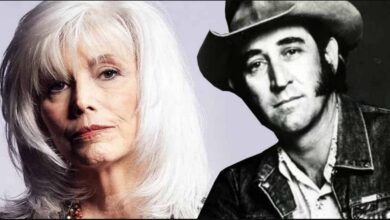Exhausted, He Performed Iconic Songs For The Final Time
Johnny Cash, often referred to as “The Man in Black,” was a towering figure in American music whose influence crossed genres and generations. Born on February 26, 1932, in Kingsland, Arkansas, Cash’s early life was shaped by the struggles of the Great Depression. He learned to play guitar and perform in church, drawing inspiration from the music of the Southern Baptist Church as well as the folk, gospel, and blues music that surrounded him. His humble beginnings informed much of his songwriting, allowing him to connect deeply with audiences across the United States.
Cash’s career began in earnest when he signed with Sun Records in 1954, where he recorded enduring hits like “I Walk the Line” and “Folsom Prison Blues.” His music often echoed the themes of hardship, love, and redemption, resonating with a wide range of listeners. Cash’s deep, distinctive baritone voice and his compelling storytelling ability earned him both critical acclaim and massive commercial success. He was known for his rebellious, anti-establishment persona, which defined much of his public image. His combination of country, rock, and folk music helped him to appeal to a broader audience, making him a pioneer of the crossover genre.
The 1960s and 1970s marked a prolific era for Cash. He toured extensively, recorded numerous albums, and made a significant impact on the counterculture movement of the time. He was not just a musician but also a performer who stood for the downtrodden and disenfranchised, giving them a voice through his music. Cash was outspoken about social issues, particularly those relating to the criminal justice system, which were often reflected in his songs such as “Folsom Prison Blues” and “San Quentin.” His 1968 concert at Folsom State Prison is particularly legendary, capturing the hearts and minds of both inmates and the public, reinvigorating Cash’s career and reinforcing his status as a folk hero.
Despite his successes, Cash faced personal challenges, including battles with addiction and tumultuous relationships. However, his life took a remarkable turn when he married June Carter in 1968. June was not only a talented performer herself but also a stabilizing force in Cash’s life. Together, they created beautiful music, notably their rendition of “Jackson,” which highlighted their chemistry both personally and artistically. Their partnership exemplified love forged in adversity, providing a source of strength for both as they navigated the highs and lows of fame and personal struggles.
Cash’s recording career saw a renaissance in the late 1990s when he collaborated with producer Rick Rubin. Under Rubin’s direction, Cash recorded a series of critically acclaimed albums that featured innovative interpretations of songs from various artists, including covers of contemporary songs from artists like Nine Inch Nails and U2. This period breathed new life into Cash’s career, attracting a younger audience and earning him a new generation of fans while remaining true to his roots in traditional country music.
Tragically, Johnny Cash’s later years were marked by ill health, which culminated in his final performance in July 2003. By that time, he was already grappling with Shy-Drager syndrome, which severely impacted his mobility and health. His grief from the loss of June Carter just two months prior cast a profound shadow over this last concert. Yet, Cash’s indomitable spirit shone through as he performed at the Carter Family Fold, a venue steeped in his family’s musical legacy. The concert was an expression of his love for June and a farewell to his fans, showcasing his commitment to his craft despite his physical limitations.
The Carter Family Fold, the site of Cash’s final performance, is a site rich with music history. It is dedicated to the Carter Family, who played an essential role in shaping American folk and country music. Their legacy continues to influence countless artists, including Cash, who revered their contributions. The connection between Johnny and June through the Carter Family offers a poignant narrative within Cash’s life—a tale of love, collaboration, and shared musical heritage.
As we remember Johnny Cash, it’s important to recognize the legacy he left behind through his music and the people he influenced. His ability to narrate complex human emotions with simplicity and honesty resonates to this day, serving as a reminder of the power of storytelling through song. Cash’s life and music continue to inspire new artists and revitalize interest in American roots music, proving that the man in black will forever remain a central figure in the tapestry of music history.
In the aftermath of his passing in September 2003, the tributes and celebrations of his life poured in from all corners of the music world. His distinctive sound, style, and unwavering dedication to both music and social issues left an indelible mark that transcends time. Music lovers around the globe still connect with his songs, finding solace and understanding in his candid reflections on life, love, and loss. Johnny Cash’s journey from the fields of Arkansas to global icon is one of resilience, passion, and artistry that will continue to resonate for generations to come. Through every note and lyric, Cash remains not just a cultural icon but a living legacy that inspires the heart and soul of music.





